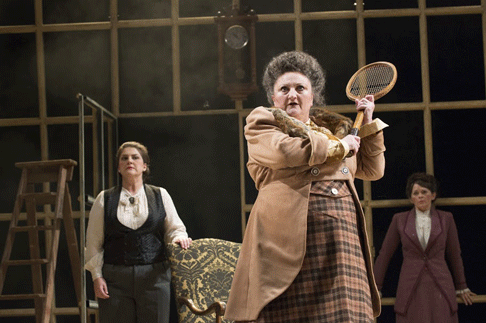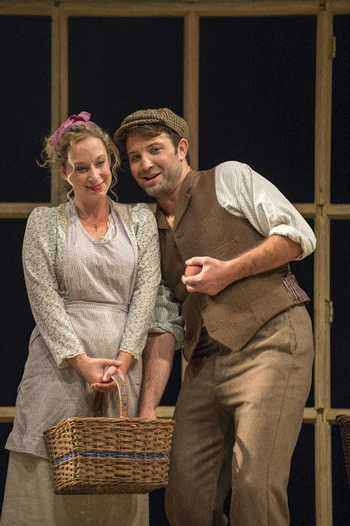17 Oct 2012
Albert Herring at Covent Garden
Labelled a “parable of oppression” by the late musicologist, Philip Brett, Britten’s provincial comedy, Albert Herring, is a tough nut to crack.

Labelled a “parable of oppression” by the late musicologist, Philip Brett, Britten’s provincial comedy, Albert Herring, is a tough nut to crack.
A director has to make us laugh while also finding the darker kernel encased in an outer shell of light-hearted satire; to enjoy and celebrate its somewhat localised, even cliquish, nature, while also recognising the continuing relevance and wider frame of reference of its themes and inferences.
Composed for the newly formed English Opera Group and first performed at Glyndebourne in 1947, the opera can seem on the surface to be a comic companion piece to The Rape of Lucretia. When Albert Herring opened the inaugural Aldeburgh Festival in 1948, the Suffolk audience must have been aware that small towns and villages around Aldeburgh, and their inhabitants, had come in for a sharp, somewhat patronising, satirical critique.
The local benefactress, Lady Billows, (modelled, according to Britten’s sister, Beth, on her mother-in-law!) has offered a prize of £25 to be given to a ‘May Queen’ as an encouragement to virtue. In the absence of a suitably chaste maiden, Albert Herring is nominated ‘May King’, to the delight of his overbearing, domineering mother. At the crowning ceremony two young lovers, Sid and Nancy, lace Albert’s lemonade with rum; called upon to give a speech he can only hiccough drunkenly, and he flees. When Albert’s orange-blossom crown is later discovered in the gutter, muddy and squashed, the worst is assumed. But, the community’s collective outpouring of grief is interrupted when Albert creeps nonchalantly back in. He explains that he has merely been enjoying experiences that have been denied him in the past and, derisively rejecting his crown, announces his new spirit of self-assertion.
In his ‘Director’s Notes’, Christopher Rolls maintains, “The key thing about Herring is that it is very, very funny. Funny because it’s full of absurd situations and recognisable characters.” That may be so, but without careful direction the somewhat dated humour can quickly slide into stereotype and caricature — what Ronald Duncan described as “church-bazaar parochialism” — and the localisms and provincialisms of Eric Crozier’s rather prosaic libretto can seem old-fashioned, even dull. To impose an overly serious sophistication on the work would undermine the animated light-heartedness of the drama; but, there must be some acknowledgement of the complex dialogues which the opera conducts: between innocence and experience, repression and liberation, subjugation and self-determination.
The black-box stage of the Linbury Theatre necessitates imaginative and economical designing, and Neil Irish’s ‘caged’ set neatly served for all three of the opera’s locations — the May Day committee room, the Herring’s greengrocer shop and the crowning banquet itself — while cleverly conveying the oppression and containment experienced not just by the brow-beaten Albert, but by all members of the Loxford community who are under Lady Billows’ domination.
 Rosie Aldridge as Florence Pike, Jennifer Rhys-Davies as Lady Billows and Anna-Clare Monk as Miss Wordsworth
Rosie Aldridge as Florence Pike, Jennifer Rhys-Davies as Lady Billows and Anna-Clare Monk as Miss Wordsworth
Albert is literally imprisoned within his mother’s shop and metaphorically oppressed by the labels imposed upon him by Loxford society. Visually, the grid-like trellis which scaled three walls also offered plenty of opportunities for surreptitious surveillance, and glimpses of the world on the other side of the bars were a reminder of Albert’s confinement and a symbol of his yearning for release. Guy Hoare’s subtle and imaginative lighting added much, as shadows surreptitiously deepened and were alleviated, reflecting the emotional swings of the drama.
At the start of Act 1, the inhabitants of Loxford assemble in turn, and the ETO cast immediately and deftly established clear-cut characterisation. Delivering, without exception, Crozier’s unassuming text in an unaffected manner, they achieved a balance between pastiche and realism, using exaggeration and over-emphasis intelligently and sparingly.
Taking her instructions from the imperious Lady Billows, the be-trousered (a hint of lesbianism?) Rosie Aldridge was a thoughtful, composed Florence, diligently noting in flexible recitative the methods she must use to gather evidence of moral corruption among the young in Loxford, while allowing her voice to bloom in more lyrical passages to suggest a latent awareness of her employer’s intolerance and narrow-mindedness.
Jennifer Rhys-Davies almost strayed into Edith Evans/Lady Bracknell territory, as the magisterial matriarch determined to ‘purify’ Loxford, but in the end her Lady Billows stayed just on the right side of caricature. Rhys-Davies had the vocal presence and dramatic stature to command the stage, particularly in her Act 1 aria where she reveals her intention to honour a May-Queen, her vitriolic abhorrence of natural passion and love stifling and silencing all those around her. The extent of the threat she poses became fully apparent in the Act 2 aria, her absurd patriotic cries “Britons! Rule the deep!” raising a laugh while also revealing a dangerous lack of self-awareness and empathy.
Bass Tim Dawkins was a witty Superintendent Budd, wily and self-congratulating in proposing Albert to be May King, while Anna-Clare Monk was a rounded, credible Miss Wordsworth, her clear, bright soprano just right for a prim schoolmistress forced to fend off the furtive, unwanted attentions of the oleaginous cleric, Mr Gedge. The latter was played with obsequious oiliness by baritone Charles Johnston, whose rich, buoyant tone fully suggested the reverend’s vain pomposity. Tenor Richard Roberts was a sprightly mayor, prone to credible outbursts of self-important earnestness.
Most importantly, the delineated individuals merged into well-blended ensembles, where as a fused musical voice they revealed the frightening power of the forces of oppression within the community. There was a very real menace in their collective bigotry; often turning to face the audience square-on, en masse they lost their individuality and humanity, in a way that, however attractive the humour, ensured that they never had our full sympathy. This was utilised effectively in the elaborate Act 3 threnody, where sheer weight of sound could not compensate for lack of sentiment or sincerity — as was impressively apparent when the cloak of mock mourning was swiftly thrown aside with the insouciant reappearance of Albert, “What’s going on?”.
 Martha Jones as Nancy and Charles Rice as Sid
Martha Jones as Nancy and Charles Rice as Sid
There are few passages of lyrical expansion within this comic score, but those moments that do exist present the crux of the drama, and express both exuberant joy and melancholy yearning. As the young lovers, Sid and Nancy, Charles Rice and Martha Jones offered a relationship characterised by natural affection, tolerance and realism; their love duet in Act 1 was tender and gentle, a much needed counterpoint to Lady Billows’ life-denying frigidity.
The gait and mannerisms of Mark Wilde’s Albert, entering laden with boxes of vegetables, aptly conveyed the weight of the burden he bears. Wilde’s relaxed, expressive tenor affectingly revealed Albert’s loneliness. Kitted out in diamond-patterned grey sweater and afflicted by a nervous tic, his dramatic eloquence was touchingly at odds with his physical appearance. Wilde’s interpretation was never sentimental. He made it clear that Albert is not wholly innocent or pure, but that he understands his ridiculers’ double entrendres, and is troubled by feelings for which he has no opportunity of expressive outlet or satiation, nascent anger and rebellion.
Returning from the feast, Wilde flung out recollections of the community’s adulation — ‘Albert the Good! Long may he reign! — with a mixture of pride and contempt. He effectively conveyed Albert’s growing anger and built powerfully towards Albert’s bitter rejection of the identities that the community imposes on him, “Albert the Good! Albert who Should!”, and “Albert the Meek! Albert the Sheep! Mrs Herring’s — Guinea Pig!” Clarissa Meek revealed the destructive nature of a mother’s suffocating love, with humour and insight. During Mrs Herring’s outpouring of loss at the end of Act 3, Meek’s avowal of grief was tinged with both regret and hypocrisy.
In the children’s roles, Emily-Jane Thomas (Cis) and Erin Hughes (Emmie) brought an apt unruly mischievousness to the staid community, pilfering fruit from the shop, teasing the inept Albert, and greedily anticipating the feast. Their boisterous energy could not even be fully quenched when they were marshalled by Miss Wordsworth to learn the May-King Anthem. At eighteen years of age, Hughes demonstrated an impressive talent.
An experienced conductor of Britten’s scores, Michael Rosewell was alert to the sharpness of the musical characterisation and the ingeniousness of Britten’s instrumentation. The sparse texture of the small ensemble enabled the individual lines to readily cut through; if the tone was sometimes a little hard that was probably at least partly due to the Linbury’s rather unsympathetic acoustic; and, in any case, a slightly harsh tone perfectly pointed the Loxford residents’ pettiness and cruelty.
This production certainly did fulfil Rolls’ stated intention to “serve both its light and dark sides”. The Maupassant short story from which the libretto was drawn, is a much darker affair, its protagonist, Isidore, coming to a painful, tragic end: “Who knows, who can tell, what grim struggle raged in the Rose-king’s soul between the powers of good and evil?”, Maupassant’s narrator asks. Albert’s liberation is presented by Rolls as an unfailingly positive outcome. Initially incarcerated by his mother’s overpowering embrace and by his public reputation for an almost unnatural innocence, this Albert is now ready to face the world on his own terms, transformed and sustained by his knowledge of love.
Claire Seymour